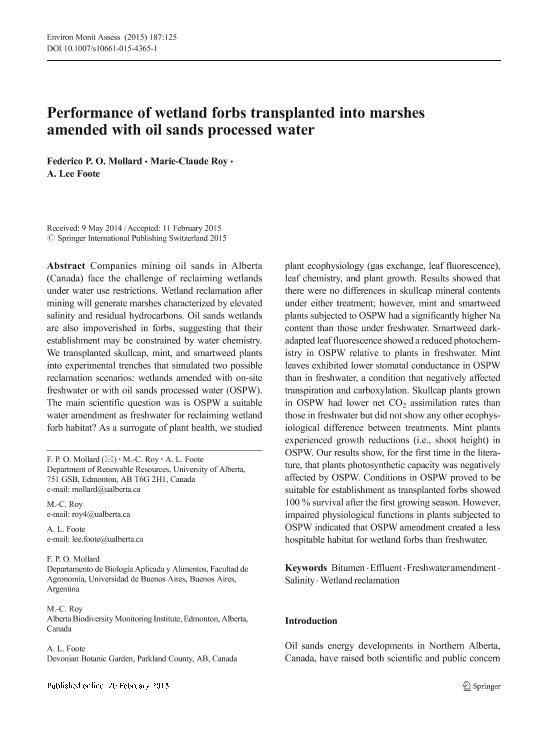Artículo
Performance of wetland forbs transplanted into marshes amended with oil sands processed water
Fecha de publicación:
03/2015
Editorial:
Springer
Revista:
Environmental Monitoring And Assessment
ISSN:
0167-6369
e-ISSN:
1573-2959
Idioma:
Inglés
Tipo de recurso:
Artículo publicado
Clasificación temática:
Resumen
Companies mining oil sands in Alberta (Canada) face the challenge of reclaiming wetlands under water use restrictions. Wetland reclamation after mining will generate marshes characterized by elevated salinity and residual hydrocarbons. Oil sands wetlands are also impoverished in forbs, suggesting that their establishment may be constrained by water chemistry. We transplanted skullcap, mint, and smartweed plants into experimental trenches that simulated two possible reclamation scenarios: wetlands amended with on-site freshwater or with oil sands processed water (OSPW). The main scientific question was is OSPW a suitable water amendment as freshwater for reclaiming wetland forb habitat? As a surrogate of plant health, we studied plant ecophysiology (gas exchange, leaf fluorescence), leaf chemistry, and plant growth. Results showed that there were no differences in skullcap mineral contents under either treatment; however, mint and smartweed plants subjected to OSPW had a significantly higher Na content than those under freshwater. Smartweed darkadapted leaf fluorescence showed a reduced photochemistry in OSPW relative to plants in freshwater. Mint leaves exhibited lower stomatal conductance in OSPW than in freshwater, a condition that negatively affected transpiration and carboxylation. Skullcap plants grown in OSPW had lower net CO2 assimilation rates than those in freshwater but did not show any other ecophysiological difference between treatments. Mint plants experienced growth reductions (i.e., shoot height) in OSPW. Our results show, for the first time in the literature, that plants photosynthetic capacity was negatively affected by OSPW. Conditions in OSPW proved to be suitable for establishment as transplanted forbs showed 100 % survival after the first growing season. However, impaired physiological functions in plants subjected to OSPW indicated that OSPW amendment created a less hospitable habitat for wetland forbs than freshwater.
Palabras clave:
Bitumen
,
Effluent
,
Freshwater Amendment
,
Salinity
,
Wetland Reclamation
Archivos asociados
Licencia
Identificadores
Colecciones
Articulos(IFEVA)
Articulos de INST.D/INV.FISIOLOGICAS Y ECO.VINCULADAS A L/AGRIC
Articulos de INST.D/INV.FISIOLOGICAS Y ECO.VINCULADAS A L/AGRIC
Citación
Mollard, Federico Pedro Otto; Roy, Marie Claude; Lee Foote, A.; Performance of wetland forbs transplanted into marshes amended with oil sands processed water; Springer; Environmental Monitoring And Assessment; 187; 3-2015; 1-8
Compartir
Altmétricas




